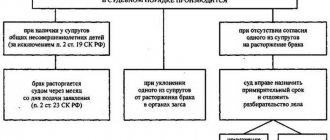In recent years, psychologists and lawyers are increasingly faced with a situation where the wife initiates the divorce. According to experts, this trend is due to the peculiarities of the perception of marriage. After all, when getting married, a woman is looking for warmth, stability, and security. Not finding reciprocity, she begins to erect a barrier that separates her from her partner. Moreover, today she has the right to defend her opinion, and there is no longer any need to endure her husband’s unfair attitude, drunkenness, and infidelity. Spouses become equal in rights, and if family life begins to become burdensome, they can both decide whether to divorce or not.
Where can I go?
You can dissolve a marriage at the registry office, at the magistrate's office, in a district or city court.
Important! The registry office dissolves a marriage without the consent of the spouse of only 3 in the cases provided for in Art. 19 of the RF IC: if there is a court decision that has entered into legal force declaring a spouse incompetent, sentenced to a term of more than three years for committing a crime, or missing. In other cases, divorces are made exclusively in court.
The magistrate considers divorce cases in which one of the spouses avoids dissolving the marriage at the registry office and does not express a desire to end the relationship.
The powers of the magistrate do not include consideration of controversial cases regarding the payment of alimony, division of property with a total value of more than 50 thousand rubles. Related issues will have to be resolved in a district or city court in the process of additional litigation.
District or city courts accept applications for divorce in the absence of the consent of one of the spouses. Additionally, questions about the payment of alimony, the procedure for communicating with the child and the place of his further residence may be considered; on the division of property if the claim price exceeds 50 thousand rubles.
The spouse filing the claim is the plaintiff, and the spouse who does not agree to file the divorce is the defendant.
The claim is brought at the place of residence of the defendant (Article 28 of the Code of Civil Procedure of the Russian Federation). The following circumstances are an exception: first, the plaintiff is forced to be with a minor child, whose relationship does not matter; second, the plaintiff, for health reasons, is unable to come to court at the defendant’s place of registration. In these cases, the claim is filed at the place of residence of the plaintiff (Article 29 of the Code of Civil Procedure of the Russian Federation).
For example, the plaintiff is a spouse. She lives with her 5-year-old daughter, born from her first marriage. The child is a minor, so the plaintiff has the right to file a claim for divorce from the 2nd husband at his place of residence.
Claims regarding the payment of alimony or establishing paternity can also be considered at the place of registration of the applicant.
Is it worth saving the family?
Most women, due to their gentle nature, are ready to sacrifice themselves for the sake of children, to endure the presence of a dysfunctional man who is capable of betraying, humiliating, insulting and even raising his hand. They spend their energy and time trying to cure their spouse of alcoholism or drug addiction and return the husband and father to the family. Such relationships, from the point of view of psychologists, need to be stopped.
It’s a different matter if a woman decides to get a divorce because of domestic troubles, far-fetched reasons that have nothing to do with reality. Then you should not rush things, but simply have a heart-to-heart talk, express all your demands, voice grievances, try to listen, understand the position and behavior of your spouse. After all, a woman was created to be the keeper of the hearth and home comfort. And who, besides her, can save it?
Can they get divorced without the consent of one of the spouses: nuances
The consent of the second spouse is not required for divorce. With mutual consent, the absence of significant disputes and common children under 18 years of age, the couple will be divorced at the registry office, and the procedure will take one month. In other cases, the official dissolution of the marriage is carried out in court. The process has a number of nuances that need to be taken into account when contacting a government agency.
If there are no children
Without children, the procedure for divorce is technically simpler and morally easier, but if one party disagrees, the process becomes more complicated and takes longer.
Despite the absence of children, it will not be possible to file a divorce at the registry office (except for the cases specified in Article 19 of the RF IC), since this requires the consent of both to divorce.
Without children and in the absence of the need to divide jointly acquired property worth more than 50 thousand rubles. You can go to the Magistrates' Court.
Note! The presence of common children who have reached the age of 18 cannot cause disagreements about their upbringing and place of residence. After reaching adulthood, children themselves decide with whom to live and communicate without outside interference.
The main problems that the plaintiff faces when the defendant does not agree to divorce are the appointment of a conciliation period by the judge, and the failure of the defendant to appear at the court hearing.
If there are children
If there are common blood or adopted minor children and there is no common property worth more than 50 thousand rubles. You can also go to the Magistrates' Court. The day before, the plaintiff needs to find out whether the other half intends to peacefully resolve issues about the place of residence of the children and the payment of alimony.
Often children become the subject of blackmail, hostages of the situation, and questions about their future have to be resolved in the district court. In such cases, it is advisable to initially file a claim for divorce and determination of the place of further residence of minors. You can file 2 different claims. This will allow for a quicker divorce, and the issue of children will be considered separately.
If the child has reached the age of 10, his opinion when determining the place of residence will be heard in court, and presence at the notary when signing a settlement agreement for children is mandatory.
How to divorce in a magistrates' court if you have children?
Spouses are entrusted with determining the future of minor children. It depends on their will where the child will live after the divorce, whether he will feel abandoned, unnecessary to his parent, and whether he will feel the difficulty of the situation.
Concluding a peace agreement is not only a way to resolve the issue of children in a civilized manner, without negative emotions, but also one of the decisive arguments in favor of persuading the second spouse to voluntarily dissolve the marriage. One document solves many problems:
- it is determined where and with whom the children will live;
- the procedure for communicating with the child is approved;
- the amount and frequency of alimony payments are prescribed, and the amount must be no less than what the child would receive by law.
A document containing a clause on the financial support of the heir must be certified by a notary. A properly executed agreement acquires the force of a writ of execution.
Mutual signing of a document in the presence of a lawyer is one of the ways to resolve disputes before going to court and obtain the consent of the second spouse to divorce.
Features of divorce in the presence of children under 1 year
According to the family code, women are given greater opportunities to take initiative in the case of divorce than men. Art. 17 of the RF IC states that the father of a child does not have the right to file a claim for divorce if:
- child under 1 year old;
- the baby died, but 1 year has not passed since the day of his birth;
- the birth of a child is expected.
In these cases, the written consent of the spouse for divorce should be obtained.
If the other half categorically does not agree to dissolve the marriage, there are two options: the first is to wait for the expiration of 1 year from the date of birth of the heir; the second is to convince the child’s mother to approve the divorce initiative.
A woman with a baby needs guarantees that, despite the inability to start work, she will be financially secure and the child will receive care and attention from the father. All this can be stipulated in the agreement regarding children.
How to get a divorce if one of the spouses does not agree to divorce through the court
Divorce will be filed through the court even if one of the parties disagrees; you can only extend the period of divorce or suspend the process, but in most cases, attempts to save the family are futile and only worsen already tense relationships.
Divorce in court without the consent of the spouse is possible only by following the developed algorithm of actions, adjusting them to the prevailing circumstances.
Procedure
By determining in what sequence to act, the plaintiff will save time and nerves. The divorce initiator must:
- Decide where to go: to the magistrate or to the district court.
- Prepare for a visit to the court. The plaintiff must pay the state fee, draw up a statement of claim, and collect the necessary documents. The materials are then submitted to the court for review.
- Receive information about the date of the meeting.
- Take part in the meeting. The plaintiff has the right to appoint a proxy in his place and to petition for consideration of the case in his absence.
- Wait for the court decision to enter into legal force.
- Contact the registry office to obtain a divorce certificate. To do this, you need to fill out the appropriate application and pay the state fee for entering new information into the civil registration book.
A detailed consideration of each stage will help you avoid mistakes.
Procedure
The plaintiff draws up a statement of claim and pays the state fee. The payment receipt must be attached to the application along with a package of documents. The judge has 5 days to review them to identify any inaccuracies.
The plaintiff may be denied acceptance of documents if the rules of jurisdiction are violated, there are errors, or the statement of claim is incorrectly drawn up. After eliminating the shortcomings, the documents are resubmitted.
The defendant is notified of the date of the hearing by sending a notice. Ignoring the summons means that the judge has the right to consider the case and make an appropriate decision without the presence of the defendant (Article 233 of the Code of Civil Procedure of the Russian Federation).
During the process, the jurisdiction of the case may change. If the plaintiff appealed to the magistrate, and the defendant filed a counterclaim, for example, to determine the place of residence of children, division of property worth more than 50 thousand rubles, these issues, as well as related ones, are referred to the district court for consideration (clause 3 Article 23 of the Code of Civil Procedure of the Russian Federation). In this case, the magistrate makes a ruling on the transfer of the case.
The plaintiff is not required to attend the hearing. To consider a case in absence, you must submit a petition formatted according to the following example:
In case of failure to appear, as a rule, actions to protect interests are carried out by a third party - an attorney, lawyer.
In personal presence during the hearing, the plaintiff must justify the reason for the divorce, explain why reconciliation with the other half is unacceptable, provide evidence in the form of documents: certificates of alcohol abuse by the second spouse, registration with the police, and long-term living apart from each other.
If the spouse does not agree with the above, the plaintiff has the right to bring witnesses. This must be stated in the application orally or in writing. Witnesses may be called at any stage of the trial. It is important to consider that the more witnesses there are, the more contradictory the testimony may be.
The written form of the petition is drawn up according to the following model:
The defendant may petition the judge to grant a period for reconciliation. If the plaintiff did not confidently present the arguments in favor of divorce, the judge will postpone the consideration of the case for up to 3 months so that the spouses can improve their relationship.
In response to the petition, the plaintiff has the right to file an objection:
Whether it is worth filing an objection is up to the plaintiff to decide. It should be noted that after a period for reconciliation has been granted, it will be extremely difficult for the defendant to appeal the judge’s decision by filing an appeal.
After the reconciliation period has expired, the judge will make a decision on divorce.
Spouses are officially considered divorced only after 1 month has passed from the date of the decision. During this period, the opponent has the right to appeal.
The judge sends the decision to the registry office at the place of registration of the union within 3 days. Spouses can take copies of the decisions themselves and submit them to the government agency. After paying the state fee and filling out the application in Form No. 10, they will be given the appropriate certificates.
You can visit the registry office at any time independently.
Statement of claim
Whether the claim will be returned for revision depends on the correctness of the claim. You can enlist the help of a lawyer or study the issue yourself.
The statement of claim must include the information specified in Art. 131 Code of Civil Procedure of the Russian Federation:
- When contacting a justice of the peace, his full name is indicated in the introductory part located in the upper right corner of the document. When submitting an application to the district court, its full name is entered. Next, information about the plaintiff and defendant is indicated: their full name, place of registration and actual residence.
- Name of the document and factual part. The title should reflect what is subject to consideration in court: divorce, determination of the place of residence of children after divorce and other issues. The factual part notes when the marriage took place, since when the relationship worsened, whether there are children together and what age they are.
- If a marriage is broken up by mutual consent, there is no need to indicate a reason; if one of the parties is against it, it is necessary to argue the reason for the divorce.
- Petition. It indicates what result the plaintiff expects to receive during the hearing. It is advisable to refer to legislative acts according to which the claim will be satisfied.
- List of applications. It is necessary to indicate all documents related to the claim: identification documents confirming the stated circumstances of the case.
- The date of preparation of the document and the signature of the applicant (the authorized representative for a notarized power of attorney) are placed at the end.
A unilateral divorce procedure requires specification of the arguments in favor of divorce, and sometimes their presentation is a problem for the applicant.
What to indicate as the reason for divorce?
Marriage is based on the principles of equality between men and women in the family; feelings of love, respect, mutual assistance and responsibility for each other; the need for mutual agreement to resolve disputes; caring for children, participating in their lives and upbringing. Failure to comply with these conditions set out in Art. 1 of the RF IC, may become a reason for the termination of marriage.
In addition to these reasons, there may be:
- Household. These include unacceptable behavior of the spouse in the family: systematically being drunk or under the influence of drugs; use of obscene expressions when communicating, manifestation of aggression; despotic attitude towards wife and children. The above must be confirmed with documents - certificates from the police department, drug treatment clinic, or witnesses must be invited to testify.
- Material. Reluctance to work when given the opportunity often becomes the cause of dissatisfaction with family relationships.
- Purely personal , intimate in nature (perverted sexual behavior, infidelity). It is not recommended to indicate such reasons in the claim. If the intimate life has resulted in physical harm that must be declared in court, the initiator of the divorce will be able to apply for a closed hearing.
Read more in the article: Reasons for divorce in the statement of claim
The plaintiff should indicate that a period for reconciliation is not required, since restoration of trust and feelings of love is impossible under the current circumstances.
Sample application for divorce
A document confirming payment of the state fee is attached to the application, otherwise the judge will not accept the claim. The amount of payment is established by the Tax Code of the Russian Federation.
State duty
When going to court, the plaintiff needs to find out the details, fill out a receipt and pay the required amount at the bank branch.
The state duty is 600 rubles. It is submitted only by the plaintiff (Clause 1, Subclause 5, Article 333.19 of the Tax Code of the Russian Federation).
If you need to file a claim for alimony payment, you must pay a state fee in the amount of 150 rubles. (clause 1, clause 14, article 333.19 of the Tax Code of the Russian Federation). The amount increases by 2 times if at the same time a demand is made for the payment of alimony to the plaintiff.
When dividing joint property, an additional payment of state duty is required, the amount of which increases as the price of the claim increases. The calculation is made according to the table data:
| Price category, rub. | % of the difference between the declared value and the lower price limit | Additional fixed payment, rub. |
| 1–20 000 | 4 (at least 400 rub.) | — |
| 20 001–100 000 | 3 | 800 |
| 100 001–200 000 | 2 | 3,200 |
| 200 001–1 000 000 | 1 | 5,200 |
| 1 000 000+ | 0.5 | 13,200 (not more than 60,000) |
For example, when dividing a car, the cost of which is 380 thousand rubles. The state duty will be: 5200 rubles. + 1% X (380 thousand rubles - 200 thousand rubles) = 7 thousand rubles.
After a divorce in court, you will need to contact the registry office. Both spouses pay a state fee of 650 rubles. from everyone.
The desire to change your last name will cost an additional 1,600 rubles.
Divorce terms
Divorce in court without the consent of the other party is conventionally divided into stages, the duration of which is as follows:
- Submitting a claim with a package of documents to the court and considering the possibility of its acceptance by a judge - 5 days.
- Setting a meeting date. The first hearing is scheduled 1 month after filing the application if the case is heard by a magistrate. If difficulties arise in notifying the defendant about the date of the hearing or other related problems, then according to Art. 154 of the Code of Civil Procedure of the Russian Federation, the date of the hearing is set before the expiration of 2 months from the date of filing the claim.
- If at the meeting the defendant requests reconciliation, the period is extended for a period of up to 3 months.
- The failure of the spouse to appear at the meeting entails either making a decision in his absence or setting a new date for the meeting. In practice, a divorce is carried out if the defendant fails to appear 3 times, which significantly prolongs the divorce period.
- After the decision is made, 1 month must pass for it to enter into legal force.
If the process is not burdened by disputes about children, you can get a divorce within 2 months, and this is the minimum possible period for a divorce in court. Disagreement by one of the parties increases the period for a period of up to 4 months or more.
If the husband (wife) declares the need for reconciliation of the parties
The defendant has the right to petition the court to postpone the case for a while and give the husband and wife time to think and try to save the marriage. The court usually always grants such a request and gives the parties 1 to 3 months to resolve the conflict. If the judge decides to resort to this procedure himself, for example, when the plaintiff does not speak confidently enough during the hearing, then it must be borne in mind that it is possible to reduce the period only if he makes this request together with the defendant.
The deadline for reconciliation of the parties, of course, delays the case and increases the time frame. But in this situation (if you consider it excessive and unnecessary) there is also something positive: it will be much more difficult to challenge the decision in your case in the appellate and other higher authorities.
INUSTA
What documents are needed for divorce without the consent of the spouse?
The list of documents required for divorce in court may vary depending on the surrounding circumstances.
Without children
In a divorce without children, the plaintiff provides to the court:
- a copy of the statement of claim for the second spouse;
- plaintiff's passport;
- marriage certificate (it is better to provide a copy to the court and have the original with you);
- a receipt for payment of the state duty (it should be attached to the statement of claim);
- marriage contract, if one was concluded during marriage;
- documents confirming the fact of joint acquisition of property, if the issue of its division is being resolved;
- power of attorney, if a lawyer provides interests in court.
With kids
The presence of common children and a dispute about their future fate expands the above list of documents. In addition, they are accompanied by:
- birth certificate of descendants under 18 years of age;
- conclusion of the guardianship and trusteeship authorities on the living conditions of the plaintiff and defendant;
- certificate of residence;
- salary certificate (if necessary to determine the amount of alimony payments);
- characteristics from the place of work;
- certificate of family composition;
- conclusion of the psychologist who interviewed the child.
The list can be supplemented if the plaintiff or his opponent found new facts that influence the judge’s decision in their favor.
Who will the children stay with?
The most painful issue is the place of residence of children if the parents do not reach mutual agreement when deciding it. One of the spouses can blackmail with material superiority, the presence of connections among high-ranking officials, using methods of psychological influence, but one should remain calm, relying on the rules of the law. When making a final decision, the judge pays attention to the following points:
- Results of an inspection of living conditions carried out by the guardianship and trusteeship authorities.
- Child's age. Young children remain predominantly with their mother due to the need for round-the-clock care and the baby’s affection, however, if the parent poses a threat to the life and health of the child, the court is inclined to decide in favor of the father.
- Personal qualities of spouses.
- Possibility of financial support.
- Remoteness of the place of residence from a school, kindergarten, sports and developmental institutions.
All factors are considered together. Despite the prevailing stereotype that the child will go to a wealthier parent, this is not the case. If there is a financial advantage, the second spouse must provide for his descendant by paying alimony in an amount not less than that established by Art. 81 IC RF.
In controversial cases, it is necessary to operate with the rules of the law, guided by examples of judicial practice in similar cases.
Loan obligations upon divorce
Do not forget that upon divorce, not only their property, but also their debts are divided between spouses. If the husband took out a loan and the wife gave her consent, thereby acting as a guarantor under the loan agreement, then it should be understood that upon divorce, both spouses will return the money equally.
However, there is such a document as a marriage contract. Of course, he still has many shortcomings. However, it still helps in solving some family problems. Thus, a marriage contract can be concluded at any time, even after the marriage is registered, and it is valid only after the marriage. During the existence of the family, changes can be made to the marriage contract in the presence of a notary and with his signature.
Here, in the marriage contract, you can indicate that the loan obligations are borne by the person who takes it. In the future, there may be amendments to the law that will create the same form of debt settlement.
go to top
Arbitrage practice
Without the consent of the wife in the presence of children
Citizen M. Ivanov filed a lawsuit for divorce and determination of the child’s place of residence. He indicated that the relationship with his wife actually ended 5 months ago. They have a common son who is 8 years old. In the petition, the plaintiff indicated a request to dissolve the marriage and determine the child’s place of residence with his father.
The defendant was notified of the time and place of the hearing, but did not appear in court.
At the meeting, it was found out that there was no agreement between the parents regarding the upbringing and provision of children. In fact, the son lives with his father. Citizen Ivanova has two children from her first marriage who are in a social shelter.
Over the past six months, Ivanova visited her son only once. For failure to fulfill parental responsibilities, the spouse is registered with the Juvenile Affairs Division of the Department of Internal Affairs. Ivanova’s abuse of alcoholic beverages was noted; Her children were hungry and lived in unsanitary conditions.
Taking into account all the facts, the court decided to satisfy Ivanov M.’s claim, dissolve the marriage and establish the son’s place of residence with his father.
In practice, in most cases the child remains with the mother. But if the latter does not fulfill parental responsibilities, the court will be on the side of the father.
In the absence of children, if the husband is against divorce
Citizen Sidorova A. filed a claim for divorce with the Samara magistrate. In the lawsuit, she indicated that her husband, citizen M. Sidorov, abuses alcoholic beverages, and while intoxicated, uses obscene words against her and threatens to use violence. A. noted that they have no children in common with the defendant and considers reconciliation impossible. In the petition she asked to dissolve the marriage.
Sidorov M. filed a counterclaim for the division of jointly acquired property - a car, the cost of which was 580 thousand rubles. In the petition he indicated: to transfer the car to him and oblige him to pay compensation to his wife in the amount of ½ the cost of the car.
Due to the need to divide the property, the case was transferred to the district court of Samara.
Citizen R. Sinitsina acted on behalf of the plaintiff by proxy. She clarified that reconciliation is impossible because feelings of love and respect have been lost. She asked to leave the car with the plaintiff, since the defendant has another vehicle.
The husband clarified that Sidorova A. was seriously ill, which was the reason for her desire to get a divorce. He offered to sell the disputed car or present it to his wife upon request. I don't agree to divorce.
The court decided to satisfy the plaintiff's demands for divorce. The defendant's arguments regarding his wife's illness and disability were considered groundless and irrelevant to the case.
Taking into account the fact that the defendant has a car, the disputed car was awarded to the plaintiff because she used it to get to work and to the hospital. She was ordered to pay compensation to Sidorov M. in the amount of 290 thousand rubles.
The complexity of the divorce process, in which one spouse does not want to dissolve the marriage, lies in the need to repeatedly visit the judicial authorities, spend time on additional scheduled meetings, and select materials to convince the judge to make a decision on divorce.
Divorces in a family where there is no agreement, but there are children, are not uncommon. In an effort to quickly gain freedom, spouses resort to unscrupulous methods of influencing the other half: blackmail, threats, forgetting about the moral state of the child. What they see and hear negatively affects the psyche of children and forms the wrong model of behavior in the family and society. Therefore, if it is not possible to save the family, you need to try to separate, maintaining peace, without losing your human appearance, and agreeing on the fate of the children by concluding a settlement agreement.
If the second spouse is categorical, does not make concessions, and is extremely opposed to divorce, you need to contact the district court and act in accordance with the law. A lawyer from the ros-nasledstvo.ru portal will help you correctly draw up a claim, correctly, concisely and intelligibly explain the problem; will tell you what will be a compelling argument for making a decision in favor of the plaintiff.
FREE CONSULTATIONS are available for you! If you want to solve exactly your problem, then
:
- describe your situation to a lawyer in an online chat;
- write a question in the form below;
- call Moscow and Moscow region
- call St. Petersburg and region
Save or share the link on social networks
- FREE for a lawyer!
Write your question, our lawyer will prepare an answer for FREE and call you back in 5 minutes.
By submitting data you agree to the Consent to PD processing, PD Processing Policy and User Agreement
Useful information on the topic
2
Taking a child abroad without the father's permission during a divorce
Divorced parents have equal rights to participate in...
11
Statement of claim for divorce and alimony (sample)
Conflicts during divorce are not uncommon. And when they...
3
How to file a divorce if spouses live in different cities
The place of residence of the spouses is a circumstance that determines the place of filing for divorce....
4
How to file for divorce online using the State Services portal
The development of IT technologies has greatly simplified our lives. Now, without leaving...
1
Deprivation of father's parental rights after divorce
Divorce of a marriage can be the collapse of a family in the most global sense...
1
Time limit for reconciliation in case of divorce
To dissolve a marriage, spouses apply to the registry office or court. Most…









